Restoring Mali's military pride
French General Bruno Guibert talks about the importance of the ongoing EU Training Mission in Mali and the progress being made there.
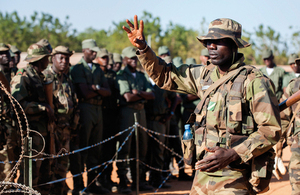
Malian soldiers at Koulikoro Training Camp [Picture: Senior Aircraftman Dek Traylor, Crown copyright]
It has been a busy morning at the Koulikoro Training Camp (KTC). Now full of lunch, a melange of military personnel from a number of European countries finish their cans of Orangina and pack their vehicles for another afternoon training Malian soldiers.
A few yards away, in an outdoor covered area complete with comfy chairs, the mission commander, French Brigadier General Bruno Guibert, is saying his final farewells to a high profile European delegation.
After the delegates had left, General Guibert said:
It was a good visit both political and military, very important. They were asking us about the training that we have been giving the Malian soldiers and we explained the progress we have made.
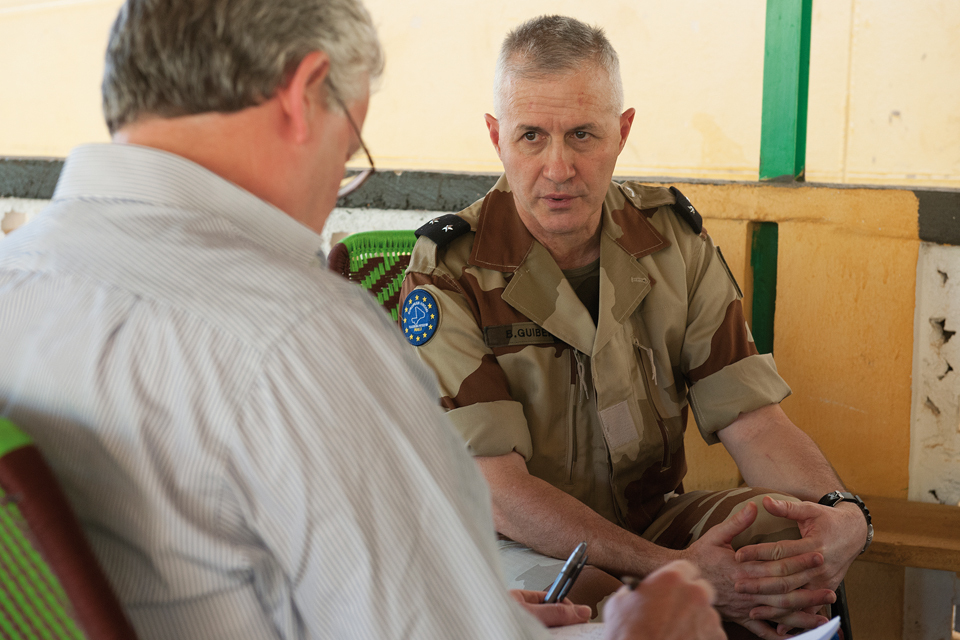
French Brigadier General Bruno Guibert speaks with Ian Carr [Picture: Senior Aircraftman Dek Traylor, Crown copyright]
While such visits might put an extra weight on the soldiers’ shoulders, they matter to the future of the mandate of the French-led EU Training Mission (EUTM). So every effort is taken to impress.
For the past year or so, the European Union’s objective has been to support Malian efforts to fully restore constitutional and democratic order by helping the authorities exercise their sovereignty over the whole of the country and thereby neutralise organised crime and terrorist threats, predominantly from the north.
An essential element of this has been the role that KTC has played in rebuilding the Malian army by training them in infantry skills and by developing in them a fresh esprit de corps.
General Guibert said:
This is the fourth battalion we have trained and we are very optimistic because the level of the commanding officer and of the tactical leaders is very good.
There is good spirit and cohesion between the officers and soldiers. The training we give is the future for Mali. The feedback we have had from the battalions who have since deployed to the north has been good and has matched the expectations of the Malians.
All the signs suggest that the EU’s objectives are being realised. Having been, in the General’s words, humiliated by jihadist insurgents in the north last year, the Malian army has managed, in a remarkably short space of time, to restore their countrymen’s pride in them.
With the EUTM’s help they have impressed civilians with their newly-honed professionalism, sense of purpose and pride. The General said:
Now, especially in the south, we can see the Malians being very proud of their soldiers. Their historic image of the army, the trust and pride that they have in them, has been restored.
Even in the north the population sees the army as an asset which can stabilise the situation there and help them live in peace, which is what the majority want.
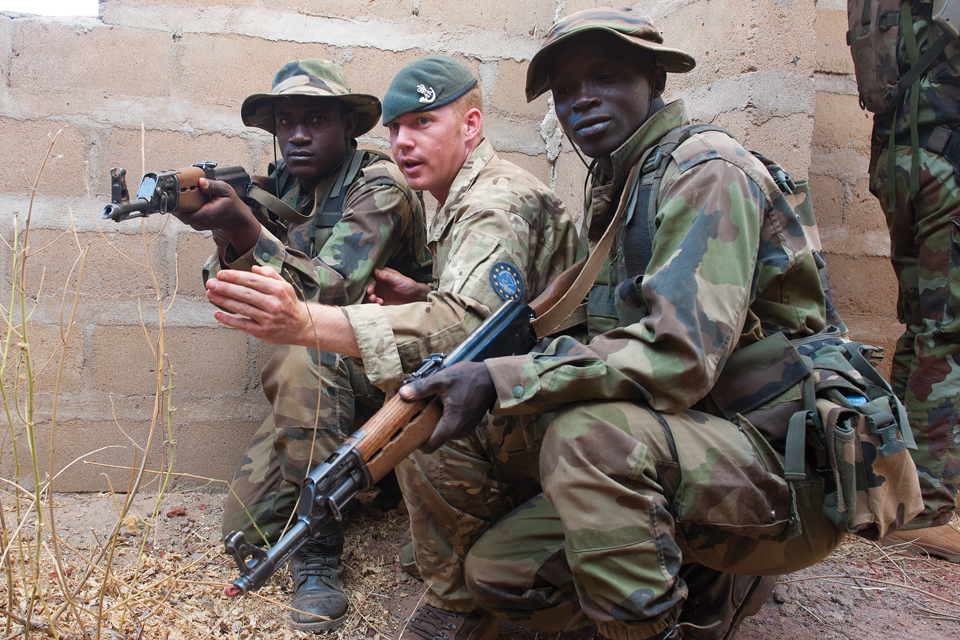
A British military mentor from 1st Battalion The Rifles trains Malian soldiers [Picture: Senior Aircraftman Dek Traylor, Crown copyright]
But, despite all the progress, the situation remains fragile and General Guibert is clear that this is no time for the European effort to relax. He said:
The security situation has improved in the north, but the terrorist threat hasn’t disappeared, and the jihadists have shown they have the ability to reorganise themselves.
Happily, there is no sign that the EUTM is about to take its foot off the accelerator pedal as the mandate, which was due to complete in May, has now been extended by 2 years. General Guibert said:
I think the European community understands how we are helping a friendly country to avoid becoming destabilised. And, they know that the European continent is only a few kilometres away from Africa, so we are here also to secure our own safety.
That is why so many European countries are in favour of the mission and want to participate.
With 4 Malian battalions having passed through the 10-week KTC programme, the intention is to train another 4. General Guibert said:
When we have done that, it means that we will have trained 6,000 soldiers by 2016 so the Malians can operate a ‘relief-in-place’ in the north, which is an important objective for the army.
But the aspiration is to go beyond that.
Throughout the course of the second mandate the autonomy of the Malian forces will be reinforced by giving them the capacity to train themselves, and eventually to train 4 more battalions, thus making a total of 12.
At the moment there are around 20 Malian trainers at KTC who, as part of the ‘train the trainers’ package, participate in the provision of training to their fellow soldiers. As the scheme develops, so this number is set to grow, and in future the plan is to enable the Malians to train themselves at unit-level within their garrisons.
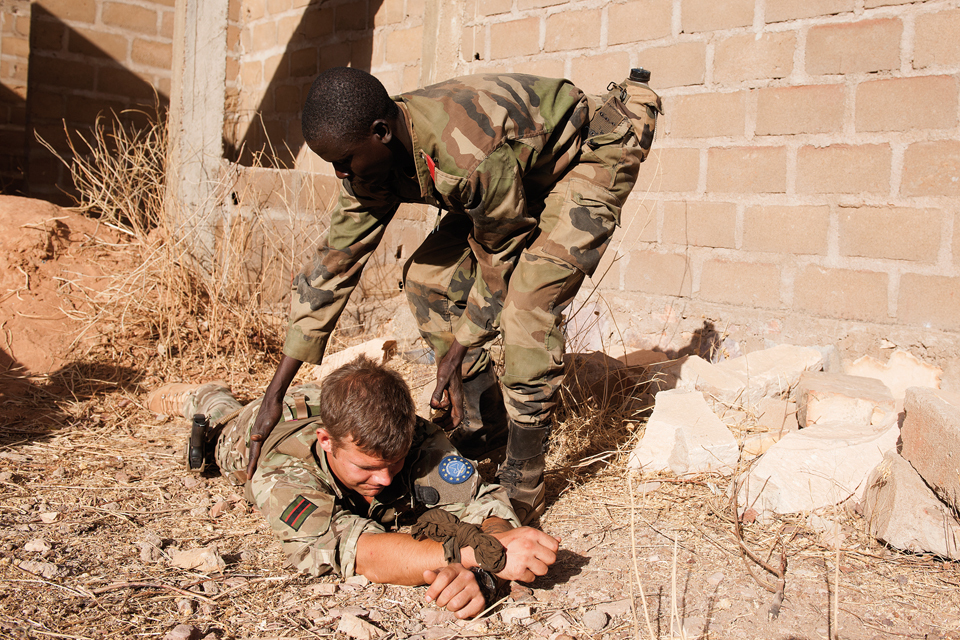
A Malian soldier learns restraint techniques at Koulikoro Training Camp [Picture: Senior Aircraftman Dek Traylor, Crown copyright]
The General said:
Training will be recycled so that the experiences of the first 4 battalions who have been here at KTC and who have then been deployed to the north can use those experiences to give additional capacity and develop tactics in the future.
It’s important that the Malians realise that it is not just here at KTC where they train, but also in the garrisons. To be effective, an army has to be able to train itself and constantly build its capability.
In the early stages at least, thoughts are being given to the role that EU troops might have in helping the Malians achieve this, though there are some support issues that will need to be sorted out first. But this is not the only task that the EU mission will be engaged in over the next 2 years.
During the second mandate a task force will be looking at organisational reforms to the Malian armed forces. In the capital, Bamako, there are currently around 20 officers engaged in advising the Malian authorities at political and high-ranking military levels. General Guibert said:
Training battalions is one thing, but you need to ensure a long-lasting environment for them to survive. For example, we are helping the ministers to think about doctrine. What is the final objective for the Malian army?
We are looking at the way the chain of command will run the army day-to-day and how they will plan for the future. That includes the human resources process and IT. Over the last year this army has not been able to do this.
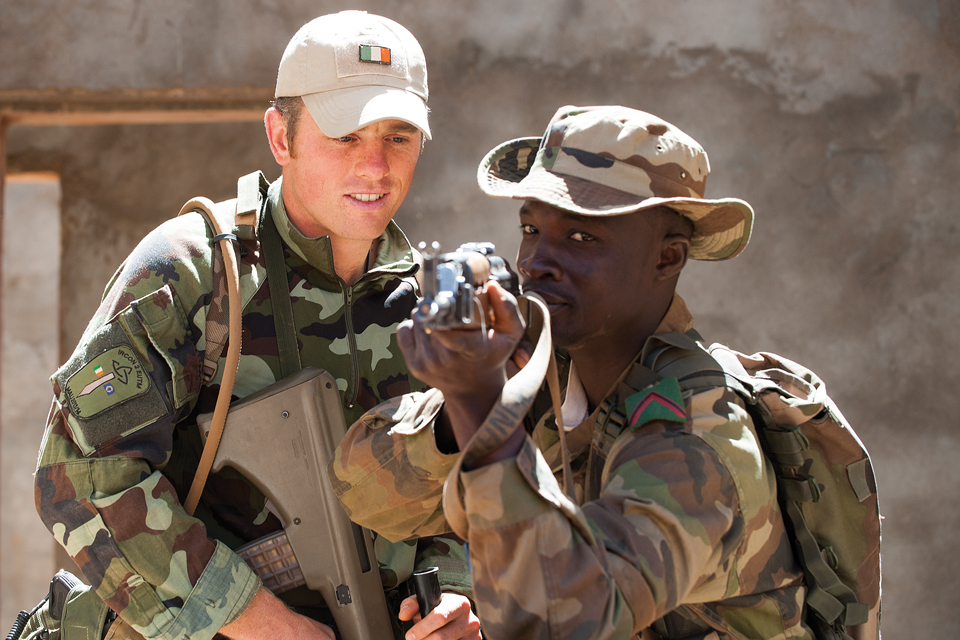
An Irish military mentor trains a Malian soldier [Picture: Senior Aircraftman Dek Traylor, Crown copyright]
While the General is looking forward to the time when the Malian authorities will politely say to their European friends ‘thank you, that is enough, we can now go on by ourselves’, for the time being he is convinced that the fragility of the region means that the international community must maintain their commitment to the country.
There is a beneficial by-product for these European partners. In a world where military co-operation is increasingly important, the mission in Mali offers a valuable chance to hone these working relationships. The General said:
It is a good way to work together in a military mission. It is not a combat mission, but we can look at our respective doctrines and learn how to work within multinational standards.
We are also learning that for a moderate investment there can be a real, effective and visible result. Yes, there is a strong relationship between the French and the British. But this mission shows us that it is a question of global investment and a common action.
There are no questions of levels of importance. It is about member states that are involved in a mission, and each participation is as important as the other.